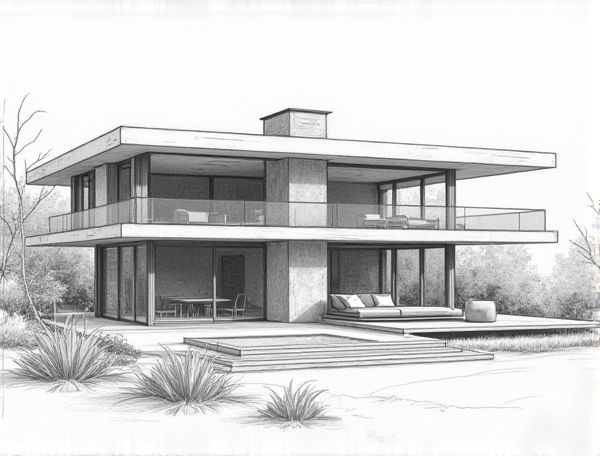
Photo illustration: Minimalist home design with smart glass partitions
Minimalist home design with smart glass partitions enhances your living space by combining sleek aesthetics and functionality, allowing natural light to flow while maintaining privacy. Discover how this innovative approach can transform your home by reading more in the article.
Introduction to Minimalist Home Design
Minimalist home design emphasizes simplicity, clean lines, and functional spaces, creating an uncluttered and serene environment. It incorporates neutral color palettes, natural materials like wood and stone, and open floor plans that maximize light and space. This design approach enhances mindfulness and promotes a calm, organized living area ideal for modern lifestyles.
The Role of Smart Glass in Modern Interiors
Smart glass transforms modern interiors by dynamically controlling natural light and privacy, enhancing energy efficiency and comfort in your living spaces. Integrating smart glass technology can reduce UV exposure, minimize glare, and lower heating and cooling costs through responsive tinting or opacity adjustments. Its sleek, minimalistic design supports seamless aesthetics while offering advanced functionality tailored to contemporary home design needs.
Benefits of Using Smart Glass Partitions
Smart glass partitions enhance home design by providing adjustable privacy and natural light control, reducing energy consumption through thermal insulation. These partitions also improve aesthetic appeal and promote a modern, flexible living space adaptable to different needs and moods.
Enhancing Natural Light with Smart Glass
Smart glass technology significantly boosts natural light in home interiors by adjusting transparency based on sunlight intensity, reducing the need for artificial lighting. Incorporating smart glass windows and partitions improves energy efficiency while maintaining privacy and enhancing the overall ambiance of living spaces.
Space Optimization in Minimalist Homes
Maximizing space in minimalist homes requires smart storage solutions like built-in cabinets and multi-functional furniture to keep your living areas clutter-free. Utilizing vertical space with wall-mounted shelves and foldable furniture enhances openness while maintaining a sleek aesthetic. Your minimalist design thrives on these strategies to create an efficient, airy environment without sacrificing style.
Privacy Solutions for Open-Plan Living
Incorporating soundproof partitions, frosted glass panels, and strategically placed furniture enhances privacy without compromising natural light in open-plan living spaces. Your home benefits from zoning techniques like sliding doors and movable screens that create flexible, secluded areas tailored to individual needs.
Energy Efficiency with Smart Glass Technology
Smart glass technology enhances energy efficiency in home design by regulating natural light and minimizing heat transfer, reducing reliance on artificial lighting and HVAC systems. Integrating electrochromic or thermochromic glass panels optimizes indoor temperature control and lowers energy consumption, promoting sustainable living environments.
Design Ideas for Smart Glass Integration
Smart glass integration in home design enhances privacy and energy efficiency by allowing dynamic control of light and heat transmission through windows. Incorporating features like switchable tinting and solar control optimizes natural daylight usage while reducing reliance on artificial lighting and HVAC systems.
Maintenance and Longevity of Smart Glass
Smart glass enhances home design by reducing wear and tear through its self-cleaning and UV-blocking properties, significantly extending window lifespan. Its advanced coatings minimize energy consumption and resist scratches, ensuring long-term durability and low maintenance costs.
Future Trends in Minimalist Living Spaces
Minimalist living spaces are evolving with smart technology integration and sustainable materials, creating environments that maximize functionality while reducing clutter. You can expect future designs to emphasize flexible layouts and multi-purpose furniture, enhancing comfort in compact areas. Energy-efficient lighting and eco-friendly finishes will also play a crucial role in defining the aesthetic and environmental impact of minimalist homes.
 homedesy.com
homedesy.com